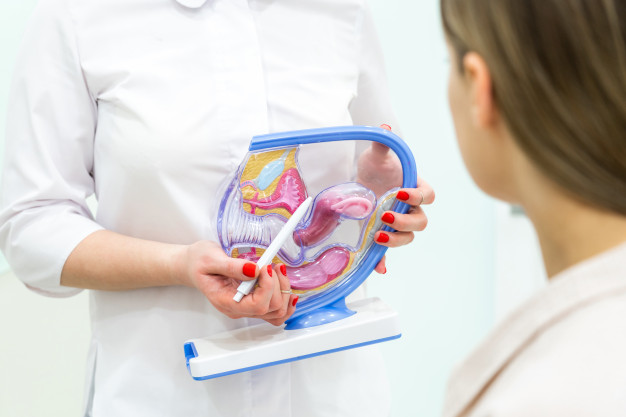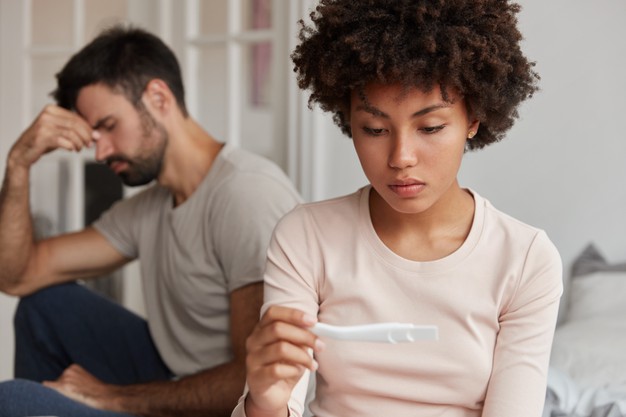TREATMENT FOR INFERTILITY

INFERTILITY
Infertility is when you haven’t been able to conceive even after a long period of trying. If a woman is able conceive but keeps having miscarriages or stillbirths, that might also be termed as infertility. Infertility isn’t just a woman’s problem. Men are often infertile too. In fact, both men and women are equally susceptible to possess fertility problems.
According to a journal on Women’s Health, about one-third of infertility cases are often attributed to female infertility while men’s problems account for an additional third of infertility cases.The remaining third of cases could also be caused by a mixture of male and feminine infertility.
CAUSES FOR MALE INFERTILITY
Generally, infertility in men is claimed to have issues with the following:
- Effective production of sperm
- Sperm count or the amount of sperm is less
- Shape of the sperm
- Movement of the sperm, which includes both the wiggling motion of the sperm themselves and thus the transport of the sperm through the tubes of the male reproductive system
Medical conditions : Some samples of medical conditions which can cause male infertility include:
- Retrograde ejaculation
- Varicocele or the swelling of the veins around the testicles
- Testicles that haven’t descended into the scrotum
- Having antibodies that attack your sperm and destroy them
- An hormonal imbalance with low testosterone production
Medications and medicines : Various medications and medicines could also affect male fertility, such as:
- Chemotherapy or radiotherapy, which are used to treat cancer
- Sulfasalazine (Azulfidine, Azulfidine EN-Tabs), which is employed for atrophic arthritis (RA) or colitis (UC)
- Calcium channel blockers, which are used for high BP
- Tricyclic antidepressants: Anabolic steroids, which are used for improved athletic performance or hormonal issues like delayed puberty
- Recreational drugs like marijuana and cocaine
CAUSES OF FEMALE INFERTILITY
Female infertility is often caused by a mixture of things that affect or interfere with the biological processes such as,
- Ovulation, when the mature egg is released from the ovary
- Fertilization, which occurs when sperm meets the egg within the fallopian tube after traveling through the cervix and uterus
- Implantation, that tends to occur when an embryo attaches itself to the uterus lining, where it could grow and become a fetus
Medical conditions : A variety of medical conditions could affect the feminine genital system and cause infertility in women. Examples include:
- Ovulation disorders, which may be caused by polycystic ovary syndrome (PCOS) or hormonal imbalances
- Pelvic disease
- Endometriosis
- Uterine fibroids
- Premature ovarian failure
- Scarring from a previous surgery
Medications and medicines : Certain medications and medicines which will affect female infertility include:
- Chemotherapy or radiotherapy
- Long-term use of high-dosage nonsteroidal anti-inflammatory drug drugs (NSAIDS) like aspirin (Bayer) and ibuprofen (Advil, Motrin)
- Antipsychotic medications
- Recreational drugs like marijuana and cocaine
SYMPTOMS
You probably don't need to see a doctor about infertility unless you have been trying regularly to get pregnant for at least one year. Women should talk with a doctor earlier, however, if they:
- Are age 35 or older and have been trying to conceive for six months or longer
- Are over age 40
- Have irregular or absent periods
- Have very painful periods
- Have known fertility problems
- Have been diagnosed with endometriosis or pelvic inflammatory disease
- Have had multiple miscarriages
- Have undergone treatment for cancer
Men should talk to a doctor if they have:
- A low sperm count or other problems with sperm
- A history of testicular, prostate or sexual problems
- Undergone treatment for cancer
- Small testicles or swelling in the scrotum
- Others in your family with infertility problems
RISK FACTORS
Many of the risk factors for both male and female infertility are the same. They include:
- Age. Women's fertility gradually declines with age, especially in the mid-30s, and it drops rapidly after age 37. Infertility in older women is likely due to the lower number and quality of eggs, and can also be due to health problems that affect fertility. Men over age 40 may be less fertile than younger men.
- Tobacco use. Smoking tobacco or marijuana by either partner may reduce the likelihood of pregnancy. Smoking also reduces the possible effectiveness of fertility treatment. Miscarriages are more frequent in women who smoke. Smoking can increase the risk of erectile dysfunction and a low sperm count in men
- Alcohol use. For women, there's no safe level of alcohol use during conception or pregnancy. Alcohol use may contribute to infertility. For men, heavy alcohol use can decrease sperm count and motility.
- Being overweight. Among American women, an inactive lifestyle and being overweight may increase the risk of infertility. For men, sperm count also may be affected by being overweight.
- Being underweight. Women at risk of fertility problems include those with eating disorders, such as anorexia or bulimia, and those who follow a very low-calorie or restrictive diet.
- Exercise issues. A lack of exercise contributes to obesity, which increases the risk of infertility. Less often, ovulation problems may be associated with frequent strenuous, intense exercise in women who are not overweight.
PREVENTION
Some types of infertility aren't preventable. But several strategies may increase your chances of pregnancy.
Couples
Have regular intercourse several times around the time of ovulation for the highest pregnancy rate. Intercourse beginning at least five days before and until a day after ovulation improves your chances of getting pregnant. Ovulation usually occurs in the middle of the cycle — halfway between menstrual periods — for most women with menstrual cycles about 28 days apart.
Men
Although most types of infertility aren't preventable in men, these strategies may help:
- Avoid drug and tobacco use and drinking too much alcohol, which may contribute to male infertility.
- Avoid high temperatures found in hot tubs and hot baths, as they can temporarily affect sperm production and motility.
- Avoid exposure to industrial or environmental toxins, which can affect sperm production.
- Limit medications that may impact fertility, both prescription and nonprescription drugs. Talk with your doctor about any medications you take regularly, but don't stop taking prescription medications without medical advice
- Exercise moderately. Regular exercise may improve sperm quality and increase the chances for achieving a pregnancy.
Women
For women, a number of strategies may increase the chances of becoming pregnant:
- Quit smoking. Tobacco has many negative effects on fertility, not to mention your general health and the health of a fetus. If you smoke and are considering pregnancy, quit now.
- Avoid alcohol and street drugs. These substances may impair your ability to conceive and have a healthy pregnancy. Don't drink alcohol or use recreational drugs, such as marijuana, if you're trying to get pregnant.
- Limit caffeine. Women trying to get pregnant may want to limit caffeine intake. Ask your doctor for guidance on the safe use of caffeine.
- Exercise moderately. Regular exercise is important, but exercising so intensely that your periods are infrequent or absent can affect fertility.
- Avoid weight extremes. Being overweight or underweight can affect your hormone production and cause infertility.
COMPLICATION
If conception does not occur after many months or years of trying, it can lead to
- stress
- depression
Our Branches
Valasaravakkam
Kotturpuram
DIAGNOSIS
Tests for men
Male fertility requires that the testicles produce enough healthy sperm, and that the sperm is ejaculated effectively into the vagina and travels to the egg. Tests for male infertility attempt to determine whether any of these processes are impaired.
You may have a general physical exam, including examination of your genitals. Specific fertility tests may include:
- Semen analysis. Your doctor may ask for one or more semen specimens. Semen is generally obtained by masturbating or by interrupting intercourse and ejaculating your semen into a clean container. A lab analyzes your semen specimen. In some cases, urine may be tested for the presence of sperm.
- Hormone testing. You may have a blood test to determine your level of testosterone and other male hormones.
- Genetic testing. Genetic testing may be done to determine whether there's a genetic defect causing infertility.
- Testicular biopsy. In select cases, a testicular biopsy may be performed to identify abnormalities contributing to infertility or to retrieve sperm for assisted reproductive techniques, such as IVF.
- Imaging. In certain situations, imaging studies such as a brain MRI, transrectal or scrotal ultrasound, or a test of the vas deferens (vasography) may be performed.
- Other specialty testing. In rare cases, other tests to evaluate the quality of the sperm may be performed, such as evaluating a semen specimen for DNA abnormalities.
Tests for women
Fertility for women relies on the ovaries releasing healthy eggs. The reproductive tract must allow an egg to pass into the fallopian tubes and join with sperm for fertilization. The fertilized egg must travel to the uterus and implant in the lining. Tests for female infertility try to find out if any of these processes are impaired.
You may have a general physical exam, including a regular gynecological exam. Specific fertility tests may include:
- Ovulation testing. A blood test measures hormone levels to determine whether you're ovulating.
- Hysterosalpingography. Hysterosalpingography (his-tur-o-sal-ping-GOG-ruh-fee) evaluates the condition of your uterus and fallopian tubes and looks for blockages or other problems. X-ray contrast is injected into your uterus, and an X-ray is taken to determine if the cavity is normal and to see if the fluid spills out of your fallopian tubes.
- Ovarian reserve testing. This testing helps determine the quantity of the eggs available for ovulation. This approach often begins with hormone testing early in the menstrual cycle.
- Other hormone testing. Other hormone tests check levels of ovulatory hormones, as well as pituitary hormones that control reproductive processes.
- Imaging tests. Pelvic ultrasound looks for uterine or ovarian disease. Sometimes a sonohysterogram, also called a saline infusion sonogram, is used to see details inside the uterus that are not seen on a regular ultrasound.
Depending on your situation, rarely your testing may include:
- Hysteroscopy. Depending on your symptoms, your doctor may request a hysteroscopy to look for uterine disease. During the procedure, your doctor inserts a thin, lighted device through your cervix into your uterus to view any potential abnormalities.
- Laparoscopy. This minimally invasive surgery involves making a small incision beneath your navel and inserting a thin viewing device to examine your fallopian tubes, ovaries and uterus. A laparoscopy may identify endometriosis, scarring, blockages or irregularities of the fallopian tubes, and problems with the ovaries and uterus.
TREATMENT
Treatment for men
Men's treatment for general sexual problems or lack of healthy sperm may include:
- Changing lifestyle factors. Improving lifestyle and certain behaviors can improve chances for pregnancy, including discontinuing select medications, reducing or eliminating harmful substances, improving frequency and timing of intercourse, exercising regularly, and optimizing other factors that may otherwise impair fertility.
- Medications. Certain medications may improve sperm count and likelihood for achieving a successful pregnancy. These medicines may increase testicular function, including sperm production and quality
- Surgery. For some conditions, surgery may be able to reverse a sperm blockage and restore fertility. In other cases, surgically repairing a varicocele may improve overall chances for pregnancy.
- Sperm retrieval. These techniques obtain sperm when ejaculation is a problem or when no sperm are present in the ejaculated fluid. They may also be used in cases in which assisted reproductive techniques are planned and sperm counts are low or otherwise abnormal
Treatment for women
Some women need only one or two therapies to improve fertility. Other women may need several different types of treatment to achieve pregnancy.
- Stimulating ovulation with fertility drugs. Fertility drugs are the main treatment for women who are infertile due to ovulation disorders. These medications regulate or induce ovulation. Talk with your doctor about fertility drug options — including the benefits and risks of each type.
- Intrauterine insemination (IUI). During IUI, healthy sperm are placed directly in the uterus around the time the ovary releases one or more eggs to be fertilized. Depending on the reasons for infertility, the timing of IUI can be coordinated with your normal cycle or with fertility medications.
- Surgery to restore fertility. Uterine problems such as endometrial polyps, a uterine septum, intrauterine scar tissue and some fibroids can be treated with hysteroscopic surgery. Endometriosis, pelvic adhesions, and larger fibroids may require laparoscopic surgery or surgery with a larger incision of the abdomen
EFFECTIVENESS OF ACUPUNCTURE TREATMENT
Acupuncture is a type of alternative medicine. It’s originally from China, but is now practiced all over the world. In recent years, scientists are inventing methods in which acupuncture might impact the biological mechanism of infertility to become an efficient treatment. Acupuncture provides a lot of benefits to people experiencing infertility, especially when combined with traditional medicine. It may help:
- Relieve stress
- Regulate hormonal imbalances
- Increase blood flow to the uterus and ovaries
Acupuncture may also be used as a standalone treatment, in conjunction with herbal medications or in addition to standard medical treatments. In a systematic review, researchers analyzed data from multiple, randomized controlled trials.
- They have found some evidence that proved acupuncture improves menstruation and ovulation in women with polycystic ovarian syndrome
- Researchers also found slight improvements to hormone levels when acupuncture was utilized in addition to medications
- A recent study found that acupuncture improved pregnancy rates in women receiving assisted reproductive technology treatments and evidences were found that acupuncture improves outcomes for women using in vitro fertilization (IVF)
- An analysis of two men with varicocele was carried recently, they had a standard sort of male factor infertility decided to check out the utilization of acupuncture for the treatment of male infertility. The study results indicated that acupuncture helped reduce scrotal temperature and reduced infertility.
MECHANISM OF ACUPUNCTURE
Acupuncture is a traditional therapy that supports the thought of energetics within the body.
- Treatment consists of inserting needles at various pressure points on the body and through the skin. Needles aren't meant to cause pain, harm or discomfort
- A professional acupuncturist would target energy (or “qi” in Chinese medicine) points for treatment. These also are termed as meridians, with some being of special benefit to painful nerves and muscles and other regions in the body
- By stimulating these points, parts of the systema nervosum also are stimulated to alleviate symptoms. Acupuncture also can provide pain relief from other similar endocrine related issues that there might not be too many remedy options
BEST CURE FOR INFERTILITY
Looking for a best solution to treat infertility, here’s why you should reach out to the expert Acupuncturist. A. Shaji Bharath from Dr.Bharath’s Acu Heal. He is currently treating patients for a wide range of conditions. As a certified acupuncture practitioner with 15 years of experience, with vast knowledge on Obstetrics, gynaecology and urology and having worked with several urologists and gynaecologists, Acupuncturist. A. Shaji Bharath has seen acupuncture doing wonders on people suffering from infertility. The effectiveness rate increases several times just with one course of
Acupuncture and it can help alleviate the symptoms, reduce pain and increase the rate of pregnancy, helping patients get back to their normal routine, by evaluating your condition and offering appropriate treatment. Most of the people swear by acupuncture, citing it as a ‘miracle’ in improving their quality of life, that focuses on treating infertility, which allows you to live a hassle free healthy life.
Dial: +91 9884746916 or Visit: drbharathsacuheal.com for more details on treating infertility using Acupuncture.
BEST ACUPUNCTURE DOCTOR NEAR ME
To choose the Best doctor for Acupuncture, it's important that the Acupuncturist should have a decade of experience and treated at least 1000 to 2000 patients.
You can also search for the Best Acupuncture Doctor near me or ask your primary care physician to refer an experienced Acupuncturist nearby. Once you find the Best Acupuncture Doctor in Chennai, you may go through their google reviews first and then fix an appointment with the doctor only when you are satisfied with the reviews.
The Best Acupuncture Doctor should address your concerns and help you feel more comfortable before your first session. Acupuncture usually takes numerous sessions or several weeks to get a complete cure in any ailment but within 3 or 4 sessions the patients will experience positive differences.
BEST ACUPUNCTURE CLINIC NEAR ME
There are numerous clinics popping up and it is sometimes skeptical to choose the best or even the safe one. To address such concerns, you can look into the following points to choose the best acupuncture clinic for treating infertility. Acupuncture is also offered in hospital, pain clinics and by healthcare organizations but it is ideal to visit the best Acupuncture Clinic. If you are not sure, it would be a good idea to contact your local doctor to see if they would be prepared to refer to the best rated acupuncture clinics. Acupuncture is offered in top rated acupuncture clinics near me because conventional treatment has failed or produces unacceptable side effects. Most of the best acupuncture clinics will spell out very clearly what type of acupuncture they practice and how professional they are - at present anyone can set themselves up as an acupuncturist but reputable practitioners will belong to an organization. So while you are filtering the best clinics for acupuncture that treats fertility problems , you can look out for these factors. Treatment without surgery for infertility is possible through acupuncture and it gives the best result.
We have been rewarded a 5-star rating from Google & Practo. You can also check the reviews there.
THE BOTTOM LINE
If you’re facing infertility, you have a reason for hope. Please don’t keep your fertility problems a secret. There is no reason to be ashamed, and you don’t need to deal with infertility alone. The vast majority of couples will be able to get pregnant with the help of acupuncture treatments. Dial: +91 9884746916 or Visit: drbharathsacuheal.com for more details.
SCIENTIFIC REFERENCES:
- Heijnen EMEW, Eijkemans MJC, de Klerk C, Polinder S, Beckers NGM, Klinkert ER, et al. A mild treatment strategy for in-vitro fertilization: a randomized non-inferiority trial. Lancet 2007;368:743-9.
- Human Fertilisation and Embryology Authority. National IVF live birth rates—guide to infertility 2006 - 2007 2007.
- National Institute for Health and Clinical Excellence. Fertility: assessment and treatment for people with fertility problems. 2004.
For further clarifications or
to fix an Appointment
Thank you for choosing us
Our experts will get back to you at the earliest
or
FAQ:
What are the services provided for infertility by Dr. Bharath’s Acu Heal?
The Acupuncturist can understand the condition of the disease only after a thorough investigation using pulse and tongue diagnosis. Infertility for women occurs due to age factors, ovulation problems, endometriosis, poor egg quality, PCOS, diabetes, hypo/hyperthyroidism, obesity, etc. The causes for male infertility are varicocele, other infections, ejaculation issues, hormonal imbalance, problems with sexual intercourse, erectile dysfunction, prior surgeries or mediations, low sperm count, unhealthy sperm, etc. The acupuncture treatment will be given either one or more of the above-mentioned conditions based on the exact requirement of the patients. Simultaneously the patient will be advised on a diet with food restrictions and exercise regime which includes an induced sound sleep that plays a vital role in improving the health of an individual.
What are the benefits of acupuncture for infertility?
(a) Acupuncture is a drugless therapy and there are no side effects.
(b) No post-treatment complications.
(c) Doubles the chances of pregnancy.
(d) Once the treatment gets over the patients will feel healthier and lighter compared to the pre-treatment days.
(e) The imbalance of hormones is brought to normalcy by increasing the estrogen levels and decreasing the androgen levels and also increasing the femininity in a woman. This makes the skin looks glowing, the vanishing of facial hair starts and the muscles get soften.
How many sessions do you need for infertility?
It takes around 40 sessions in 5 months.



 TREATMENT FOR FERTILITY
TREATMENT FOR FERTILITY
 TREATMENT FOR MALE IMPOTENCE OR IMPOTENCY
TREATMENT FOR MALE IMPOTENCE OR IMPOTENCY
 TREATMENT FOR MALE INFERTILITY
TREATMENT FOR MALE INFERTILITY
